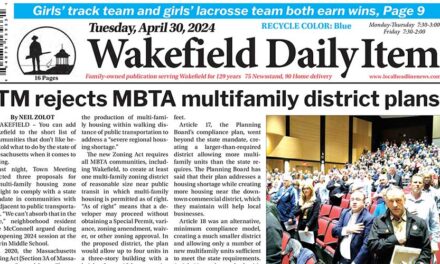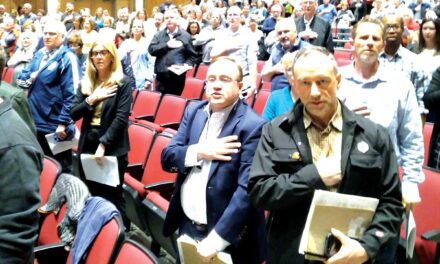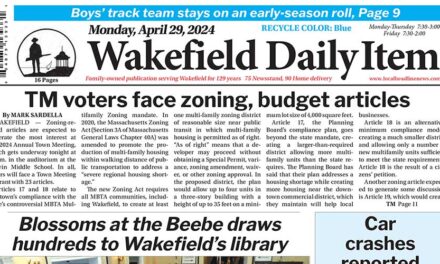Published in the September 26, 2018 edition
By MARK SARDELLA
CONCORD — As a director, Wakefield native Nancy Curran Willis has never shied away from a theatrical challenge. She won an Eliot Norton Award for “Angels in America” at Boston Theatre Works. So, it should come as no surprise that she would take on a show like “The Curious Incident of the Dog in the Night-time,” currently on stage at the Umbrella in Concord, Mass.
When Mark Haddon’s novel was adapted for the stage by Simon Stephens, many who had read the book wondered how this story about the inner world of a 15-year-old autistic savant could work as stage play. But work it did, with successful runs in London and on Broadway.
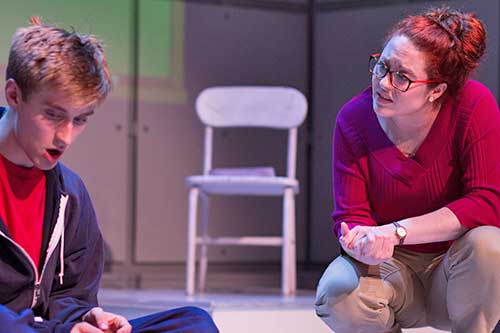
MAX CHARBONNEAU and Erin Maitland in The Curious Incident of the Dog in the Night-time, directed by Wakefield native Nancy Curran Willis at the Umbrella in Concord, Mass. (Courtesy Photo)
Set in Swindon, England, the curious incident of the title involves the killing of a dog named Wellington with a pitchfork. When the dog’s owner sees neighbor Christopher Boone (played by Max Charbonneau) kneeling beside the deceased canine, she assumes the teen did it. The police are called and when the officer touches Christopher in an attempt to bring him in for questioning, Christopher freaks out.
Christopher appears to be on the autism spectrum. He has trouble with social interaction and communication and exhibits other characteristics of the disorder. He hates being touched. But Christopher loves numbers and is a math wizard.
Christopher’s father, Ed Boone (Tom Berry) comes to retrieve his son at the police station, where the police officer lets him off with a warning. But Christopher announces that he is going to investigate the “murder” of Wellington.
Despite his father warning him to “keep his nose out of other people’s business,” Christopher forces himself through his social awkwardness to canvass the neighbors about what they know about the killing of Wellington.
One day, Christopher’s father tells Christopher about another death. His mother, Judy (Nancy Finn), has died in the hospital.
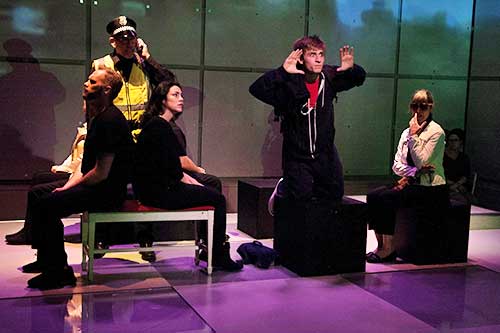
MAX CHARBONNEAU and the ensemble cast of The Curious Incident of the Dog in the Night-time, at the Umbrella in Concord, Mass. (Courtesy Photo)
Parts of the story are told by Christopher’s teacher, Siobhan (Erin Maitland) reading from Christopher’s notebook. She has convinced Christopher to turn the story of his investigation of Wellington’s murder into a school play.
The actors playing the four main characters are augmented by a talented ensemble cast. Andrew Houlihan, George Page, Scott Salley, Pamela Schweppe, Demetra Tseckares and Charlotte Wallace take on a host of different rolls, from policemen to neighbors to clergymen.
Under Willis’s direction, the Umbrella production employs some creative devices to simulate what is going on in Christopher’s brain and how he perceives the world.
Whirling projected images, pulsating lights and other sound and visual effects are effectively used to approximate Christopher’s point of view and his experience of the world around him. Cast members periodically march in intersecting patterns around and across the stage, perhaps simulating the way Christopher feels overwhelmed when too many people are around.
The set is sparse, consisting of little more that a chair and a few risers. The cast fills in the gaps. The front door of a home is a cast member’s back with a number attached to it. When Christopher knocks on the “door,” the cast member/door turns around and becomes the resident. A bathroom is a cast member holding a roll of toilet paper. An ATM machine/ensemble member accepts a card and dispenses cash.
Christopher does eventually figure out who killed Wellington, and in the process solves a mystery much closer to home.
It’s a tribute to Charbonneau that his performance is simultaneously compelling and painful to watch. Bringing that level of intensity to every performance must be exhausting.
“The Curious Incident of the Dog in the Night-time” is sometimes funny, occasionally sad and always enlightening.
What more could you ask from a night at the theater?


